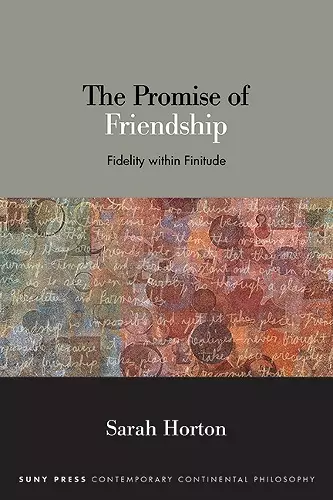The Promise of Friendship
Fidelity within Finitude
Format:Hardback
Publisher:State University of New York Press
Published:1st Nov '23
Should be back in stock very soon
This hardback is available in another edition too:
- Paperback£25.50(9781438495163)

Argues that friendship is the gift of a world that is not one's own and that transforms one's world in unforeseeable ways.
The Promise of Friendship investigates what makes friendship possible and good for human beings. In dialogue with authors ranging from Aristotle and Montaigne to Proust, Levinas, and Derrida, Sarah Horton argues that friendship is suited to our finitude-that is, to the limits within which human beings live-and proposes a novel understanding of friendship as translation: friends translate the world for each other so that each one experiences the world not as the other does but in light of the friend's always-unknowable experience. The very distance between friends that makes it impossible for them to know each other wholly also makes it possible for them to be transformed by friendship. Friendship, then, is possible and good for those who love precisely that they can never wholly know the friend. Friendship is a profound, mutual self-giving that highlights the irreplaceability of each person, fundamentally shapes the self, and is one of the greatest joys of human existence.
"In this impressive new book, Sarah Horton examines the enigmas, paradoxes, and aporiae of friendship. Through her engagement with a full cast of philosophical, theological, and literary thinkers, she makes a compelling case for friendship as a possible impossibility. This is an important new work—and an important new voice—in Continental ethics and philosophy of religion. Scholars of French phenomenology and deconstruction will be particularly interested in this work, since Horton's discussion is oriented around the philosophy of alterity found in thinkers like Ricoeur, Levinas, and Derrida, as well as current authors like Richard Kearney and Emmanuel Falque."— Brian Gregor, California State University, Dominguez Hills
ISBN: 9781438495156
Dimensions: unknown
Weight: unknown
223 pages